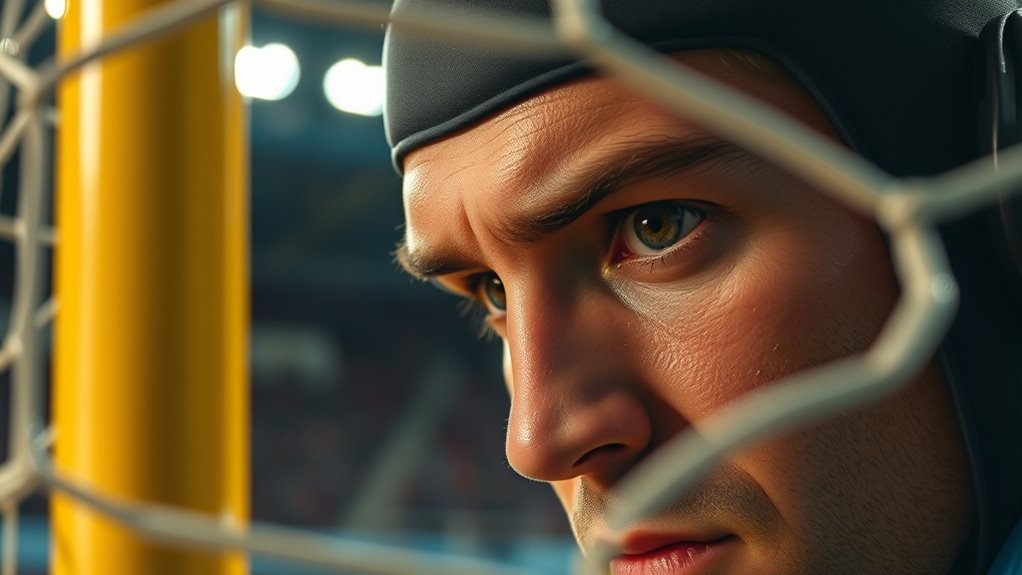Neuroscience shows that pressure during penalty kicks triggers fast, complex brain responses involving areas like the visual cortex and prefrontal cortex, which evaluate cues and past experiences. High stress can impair judgment and lead to reactive decisions instead of instinctual ones. Techniques like visualization, deep breathing, and mental focus help calm your nervous system and improve decision-making under pressure. If you want to understand how to stay ahead when it counts most, keep exploring these strategies.
Key Takeaways
- Neural activity during penalty kicks intensifies under pressure, affecting decision-making and response accuracy.
- Experience and pattern recognition enable predictive brain responses, providing a crucial advantage.
- Elevated adrenaline impairs prefrontal cortex function, causing rushed or less rational decisions.
- Stress-reduction techniques like visualization and mindfulness help maintain neural clarity and focus.
- Managing mental state enhances cue recognition and response speed, increasing success chances in high-pressure situations.

When faced with an essential penalty kick, your brain is working overtime to process pressure, anticipate the shooter’s move, and make split-second decisions. During this high-stakes moment, your brain activity ramps up as it scrambles to analyze the situation, filter relevant cues, and select the best response. This surge in neural activity involves multiple regions working together—your visual cortex analyzes the shooter’s body language, while the prefrontal cortex weighs options based on past experiences. The pressure can cause your decision-making process to become hurried or clouded, leading to hesitation or incorrect guesses. Understanding how your brain functions in these moments can help you develop strategies to maintain clarity and focus. Additionally, research into diverse decision-making highlights how varied neural pathways contribute to rapid judgments under stress. Your decision-making is heavily influenced by the balance between emotion and rational thought. When adrenaline floods your system, it can impair the frontal cortex’s ability to make precise judgments, causing you to rely more on instinct than careful analysis. This heightened emotional state can either sharpen your reflexes or freeze your response, depending on how well you control your anxiety. Neuroscience shows that managing stress levels helps keep your decision-making sharp, enabling you to process information more effectively and choose a confident, well-timed action. Additionally, your brain’s ability to predict the shooter’s intentions is indispensable. When you’ve played the game multiple times or studied patterns, your brain develops a sort of unconscious prediction model, allowing faster recognition of cues like foot placement or body orientation. This predictive brain activity can give you an essential edge, helping you anticipate where the ball will go before the kicker strikes. However, if your mind is overwhelmed with pressure, this predictive ability diminishes, and your responses become more reactive than proactive. To beat penalty-kick pressure, you need to understand this neural process and actively work on controlling your brain activity. Techniques like visualization, deep breathing, and mindfulness can help calm your nervous system, reducing the impact of adrenaline on decision-making. By training your brain to stay focused and composed, you can enhance your ability to assess cues accurately and respond confidently. Remember, your mental state directly influences your neural response, so mastering your mindset is just as important as physical preparation. When you control your brain activity, you give yourself the best chance to make the right decision when it counts the most.
Frequently Asked Questions
How Does Brain Activity Differ Between Experienced and Novice Penalty Takers?
When you compare experienced and novice penalty takers, you notice differences in brain activation during decision-making processes. Experienced players show more focused activity in areas linked to automatic responses, allowing quicker, more confident decisions. Novices, however, exhibit broader activation in regions associated with conscious effort and uncertainty, leading to hesitation. Your brain’s ability to streamline decision-making through experience helps you stay calm and perform better under pressure.
Can Mental Training Techniques Permanently Reduce Penalty-Kick Anxiety?
You can definitely reduce penalty-kick anxiety with mental training techniques. Building mental resilience helps you stay calm under pressure, while visualization techniques prepare your mind for success. Consistent practice of these methods can create lasting changes, making you more confident during penalties. Over time, these strategies become ingrained, helping you perform better even in high-stress moments. Keep training your mind, and you’ll notice long-term improvements in handling pressure.
What Role Does Dopamine Play During High-Pressure Penalty Situations?
During high-pressure penalty situations, dopamine plays a key role in neural signaling, reinforcing your reward system. When you succeed or stay calm, dopamine release boosts your motivation and focus, helping you perform better. It signals a sense of achievement, reducing anxiety. Understanding this, you can leverage dopamine’s influence to stay composed, by focusing on positive outcomes and using mental techniques that activate your reward pathways to improve your penalty-kick success.
Are There Differences in Neural Responses Between Successful and Unsuccessful Penalties?
You notice differences in neural responses during penalties; successful kicks often involve heightened activity in the visual cortex, helping you focus on the target. Unsuccessful attempts may show less engagement in motor planning areas, leading to poor execution. Your brain’s ability to coordinate visual processing and motor planning is essential—when these areas work in harmony, your chances of success increase. Stay focused and trust your neural pathways to perform at their best.
How Does Sleep Influence Neural Readiness for Penalty Shootouts?
Sleep markedly sharpens your neural readiness for penalty shootouts. Prioritizing sleep hygiene helps your brain process pressure, planning, and precision better. Dream analysis reveals subconscious cues and emotional states that can influence performance. When you sleep well, your mind recharges, recall improves, and reaction times quicken. Skimping on sleep hampers neural function, increasing anxiety and decreasing confidence. To excel, establish a sleep routine, analyze dreams for insights, and let restful rest boost your game.
Conclusion
Understanding the neuroscience behind penalty-kick pressure shows you’re not alone in feeling nervous. Imagine a goalkeeper who, despite his anxiety, visualizes success and stays focused, turning pressure into power. Just like him, you can reframe nerves as adrenaline that sharpens your performance. Next time you face a tough moment, remember that your brain can be your ally. With the right mindset and techniques, you’ll be ready to beat the pressure and succeed.










